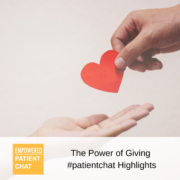What Role Do Breast Cancer Patients Play in Care and Treatment Decisions?
What Role Do Breast Cancer Patients Play in Care and Treatment Decisions? from Patient Empowerment Network on Vimeo.
What is shared decision-making? Breast cancer expert Dr. Adrienne Waks outlines the shared decision-making process and explains how patients can play an active role in their care.
Dr. Adrienne Waks is the Associate Director of Clinical Research at Dana-Farber Cancer Institute. To learn more about Dr. Waks click, here.
See More from Thrive Breast Cancer
Related Resources:

|

|

|
Transcript:
Katherine:
What is shared decision-making, and how does it work?
Dr. Waks:
So, to me basically what that means is that patients and providers are working together to decide what are the best steps to take in a patient’s treatment plan, essentially. I see my role as the provider being to lay out the menu of options and try to, of course, offer some guidance about which might be the best, which are less preferred, why that is. But then, to guide the discussion and then have the subsequent conversation with the patient about how do they take in that information, what feels like the right fit to them and then incorporate their preferences into the actual plan we make in terms of how to go forward.
Katherine:
Well, what role do patients play in the decision-making?
Dr. Waks:
I think the patients play the most important role ultimately. You know, what I always say to patients is I’m always going to try to offer my opinion. Again, lay out a variety of different options and then offer my opinion because I think I would imagine it could be frustrating if you’re a patient and you go to a doctor and they say like here are five options, and you can just select between them. So, it’s definitely I think the physician’s role to try to put some value judgments or comparisons of the different options, but ultimately, basically every single decision is the patient’s, and I can tell them that’s what I would have done or that’s not what I would have done, but I understand where you’re coming from.
Again, it’s not like your physician isn’t there to guide you and give feedback and try to tell you what the best choice is. But actually ultimately in breast cancer management and in a free medical issue, it is ultimately the patient’s decision, so their voice is the most important one.










